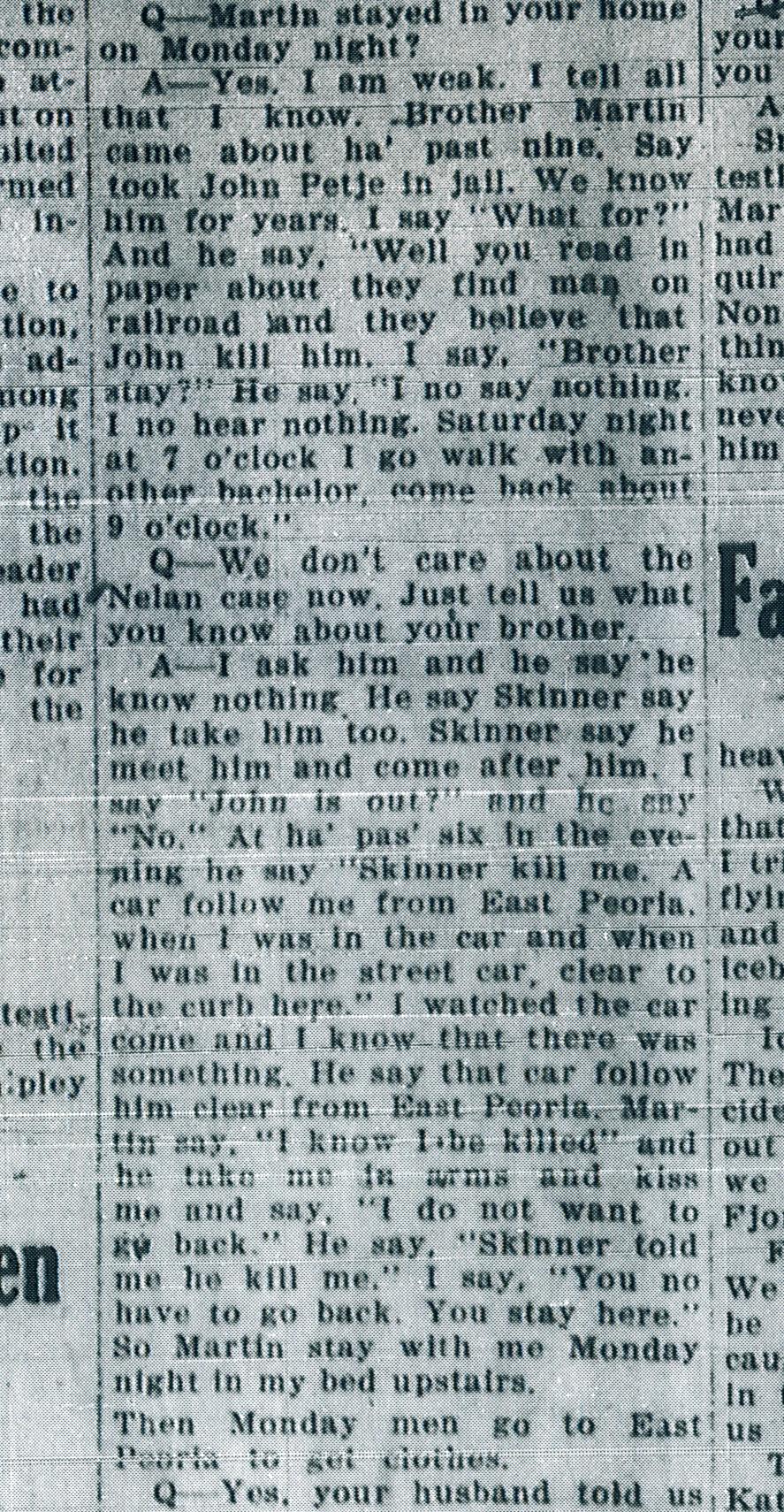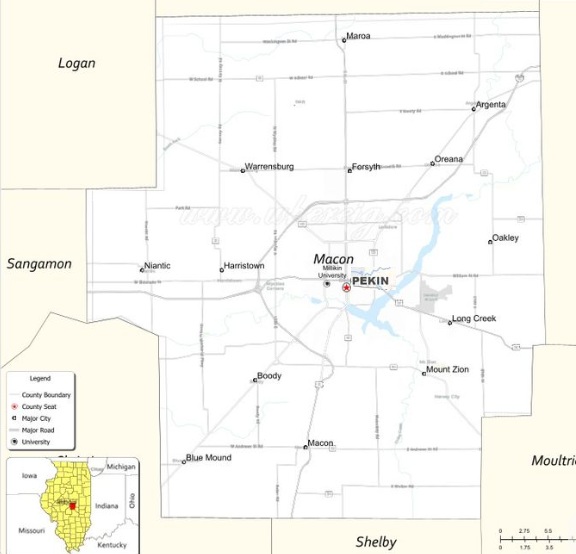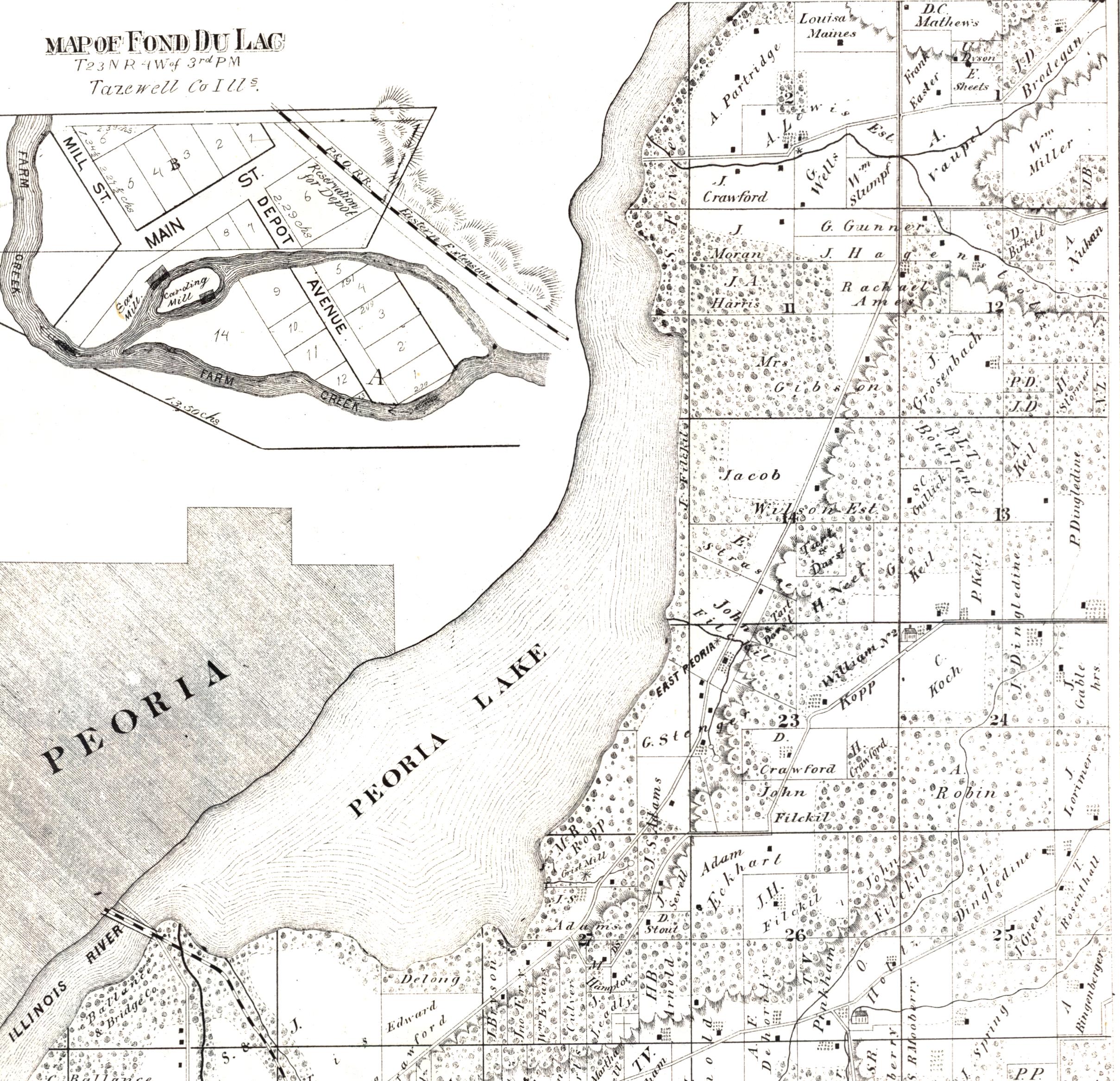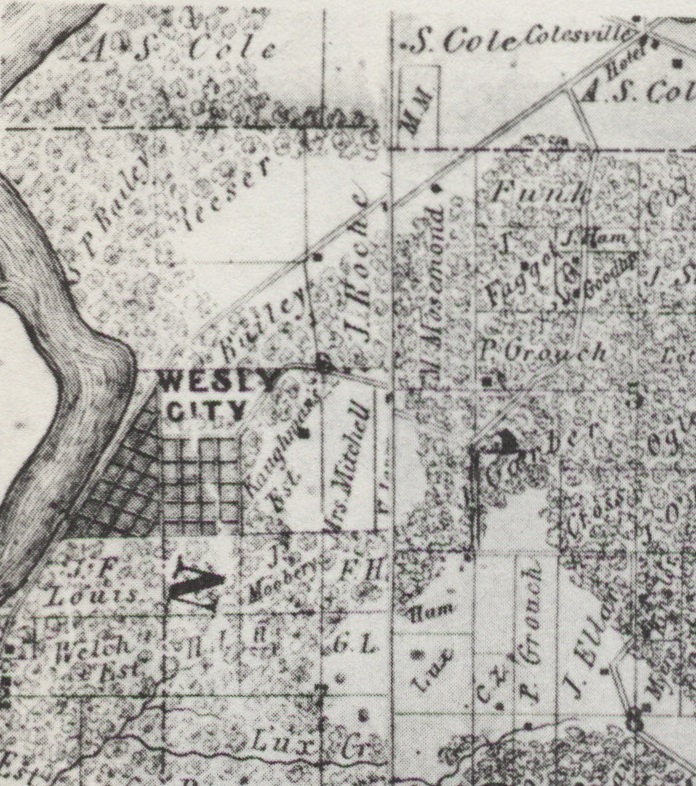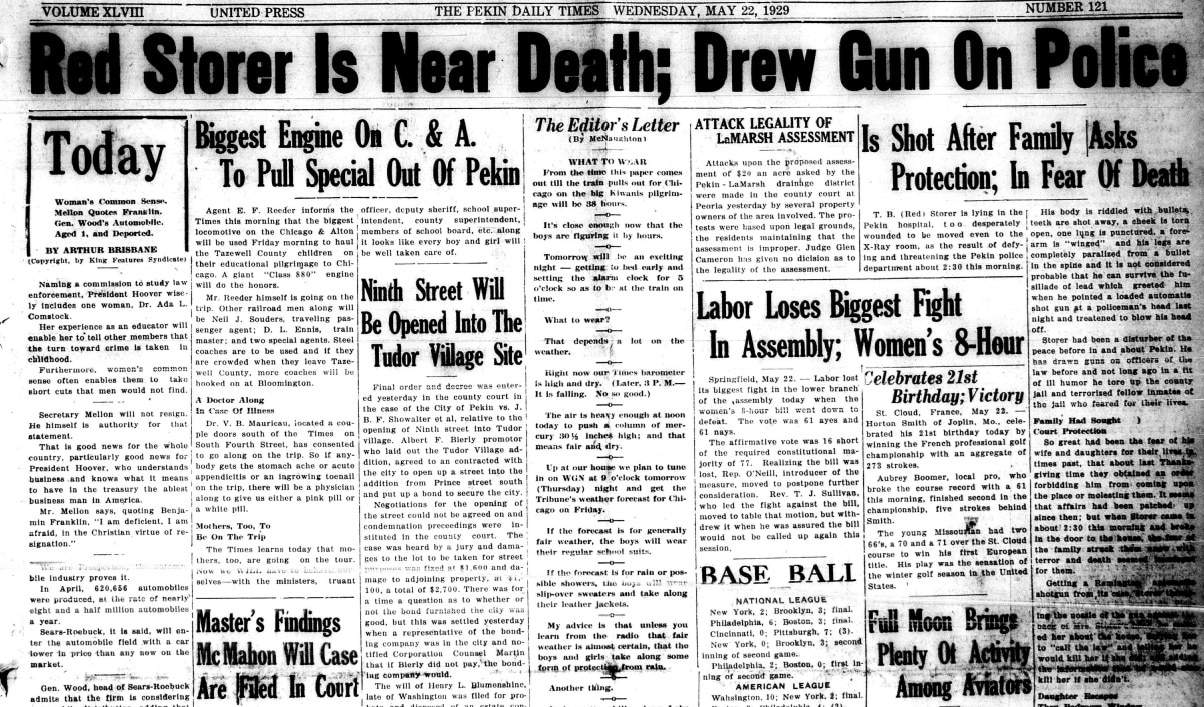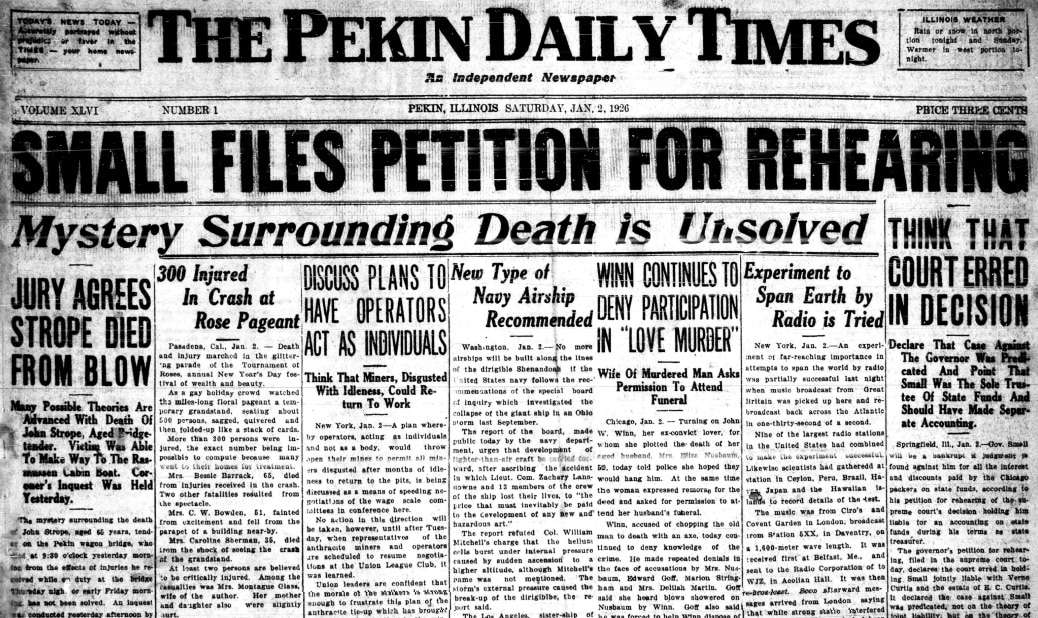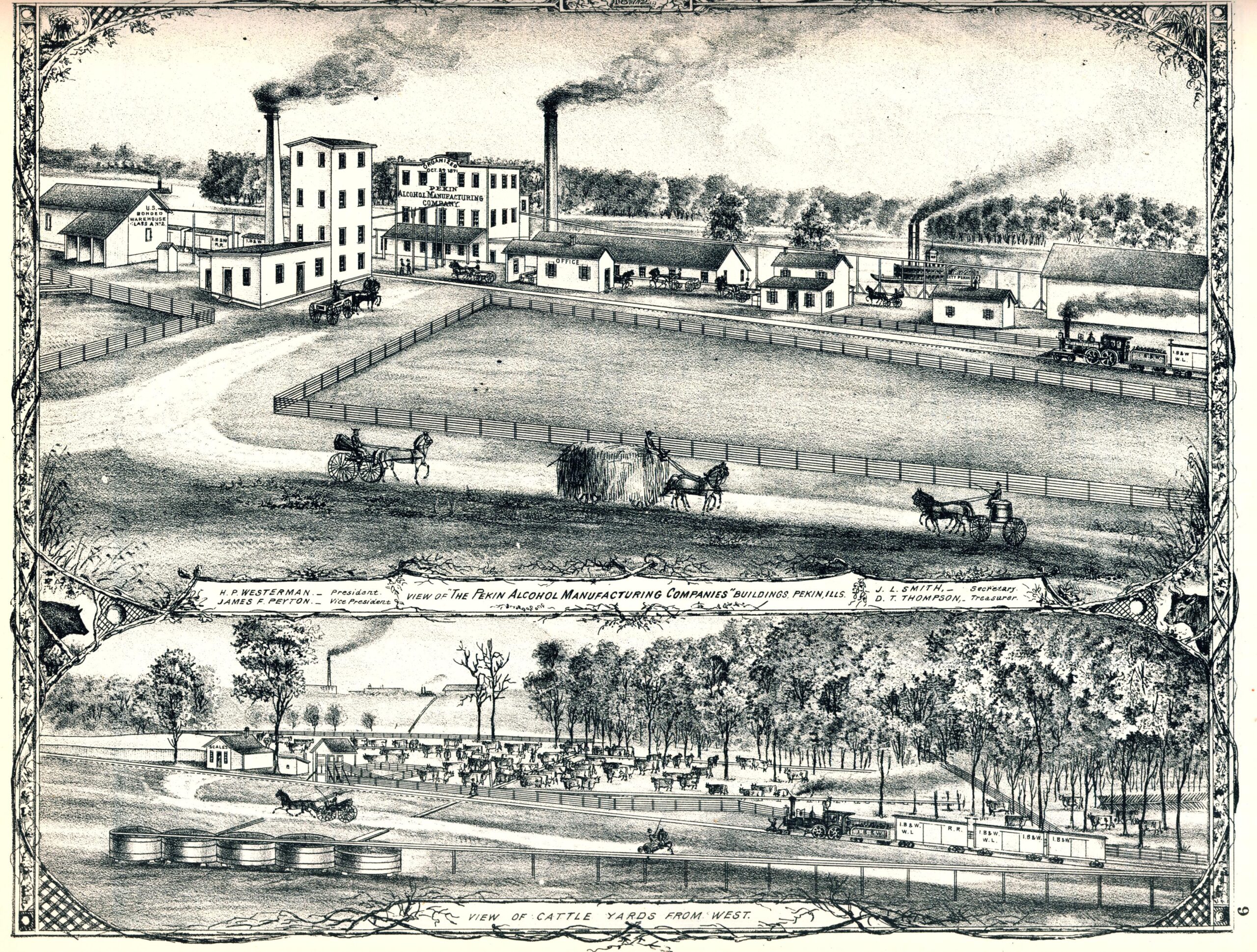With this post to our Local History Room weblog, we continue our series on a pair of sensational deaths that occurred in Pekin, Illinois, during the Prohibition Era. The Local History Room columns in this series, entitled “The Third Degree,” originally ran in the Saturday Pekin Daily Times from Sept. 15, 2012, to March 2, 2013.
THE THIRD DEGREE
By Jared Olar
Library assistant
Chapter Eight
Standing room only at the inquest
At 1:30 p.m. Monday, Sept. 12, 1932, the Tazewell County grand jury took up the case of the shocking murder of Martin Virant, whose dead body had been hanged in the Tazewell County Jail on Sept. 1 after he had succumbed to severe injuries he had suffered at the hands of county deputies while he was in their custody.
Over the next five days, the grand jury would devote its attention solely to the Virant case. While the grand jury was in the midst of its proceedings behind closed doors at the Tazewell County Courthouse, the coroner’s inquest into Virant’s death also got under way nearby, at Kuecks Funeral Home on Capitol Street.
The inquest began at 2:10 p.m. Wednesday, Sept. 14, “before a crowd that filled every seat, doorway and window of the place,” said the story on the front page of that day’s edition of the Pekin Daily Times. “Attorneys, stenographers, and reporters from afar are present as the most debated death in Tazewell county in many years faces official investigation.”
A large crowd attending a coroner’s inquest is unusual, but then Virant’s death was unusual and had outraged many. As the Sept. 9, 1932 Pekin Daily Times had said, “. . . the sensational stories and circumstances attending this man’s death [have] been a general topic for discussion not only in Pekin and Tazewell county, but in neighboring communities and thruout the state. Stories of this death have been carried, under glaring headlines, by newspapers and press bureaus in almost every state in the central west, and it has gone over the radio to probably every section of the country.”
Another thing that was unusual about the inquest is that it took place over two consecutive afternoons. Tazewell County Coroner A. E. Allen summoned a long, solemn procession of witnesses to give testimony at the inquest. Many of the same witnesses also testified before the grand jury.
The first witness at the inquest was East Peoria City Clerk E. W. Tucker, one of several people who had seen Virant on the day he was taken in for questioning by Deputy Charles O. Skinner and Deputy J. Hardy Garber. Tucker and other witnesses testified that Virant had no visible injuries before he was taken to the sheriff’s department.
Another witness, Charles E. Schmidt, an East Peoria justice of the peace, said that he was told by Virant’s brother-in-law Frank Franko that “Martin had been in a happy spirit when he had left with the officers.” But Franko and his wife both told the coroner’s jury that Virant was worried that Skinner might do him harm.
Virant’s brother-in-law said Virant, a coal miner, wanted to change into some clean clothes. “Then that big fat fellow, Skinner, said, ‘No, he don’t need any clothes.’ But I told him that Martin wanted to change his dirty clothes. He said, ‘He don’t need them for he is going right with me.’ Well that made Martin pretty nervous because of what happened the day before when he heard about a friend of his getting beat up . . . Martin said, ‘Frank, I’ll tell nothing but the truth, but I’m afraid to go, I know I’m going to get beat up.’”
It’s unclear from Franko’s testimony why Virant would have been expected to get beaten up. Franko did not specify if it was Skinner or someone else who allegedly beat Virant’s friend (did Franko mean Lew Nelan?), but he mentioned that on the day before Virant was taken in for questioning, Virant “wouldn’t go back to his house to live ’cause he was afraid of getting kidnapped or mobbed or something.”
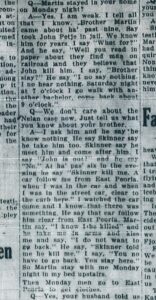
After Franko finished his testimony, his wife Agnes, Martin Virant’s sister, was called. She also said her brother was afraid that he would be beaten when the deputies took him to jail. Even more, she claimed her brother told her just before he was taken to Pekin that Skinner had threatened to kill him.
“At ha’ pas’ six in the evening he say ‘Skinner kill me. A car follow me from East Peoria, when I was in the car and when I was in the street car, clear to the curb here.’ I watched the car come and I know that there was something,” Agnes Franko told the coroner’s jury. “. . . Martin say, ‘I know I be killed’ and he take me in arms and kiss me and say, ‘I do not want to go back.’ He say, ‘Skinner told me he kill me.’”
Agnes Franko said her husband tried to see Virant at the jail on Wednesday, Aug. 31. “They wouldn’t let husband see Martin Wednesday morning. Say he kept for witness. Husband come home, say ‘Give me money – hundred dollars – I get lawyer and doctor – Martin get beaten and near killed.’ I cry and give him money I saved, $120, and say, ‘He killed alread.’”
The last time she saw her brother alive was the day Skinner and Garber took him for questioning. Concluding her testimony, Agnes said, “Last word I hear out of his mouth was ‘They kill me, Sheriff and Skinner.’”
Next week: The coroner’s jury issues its verdict.


